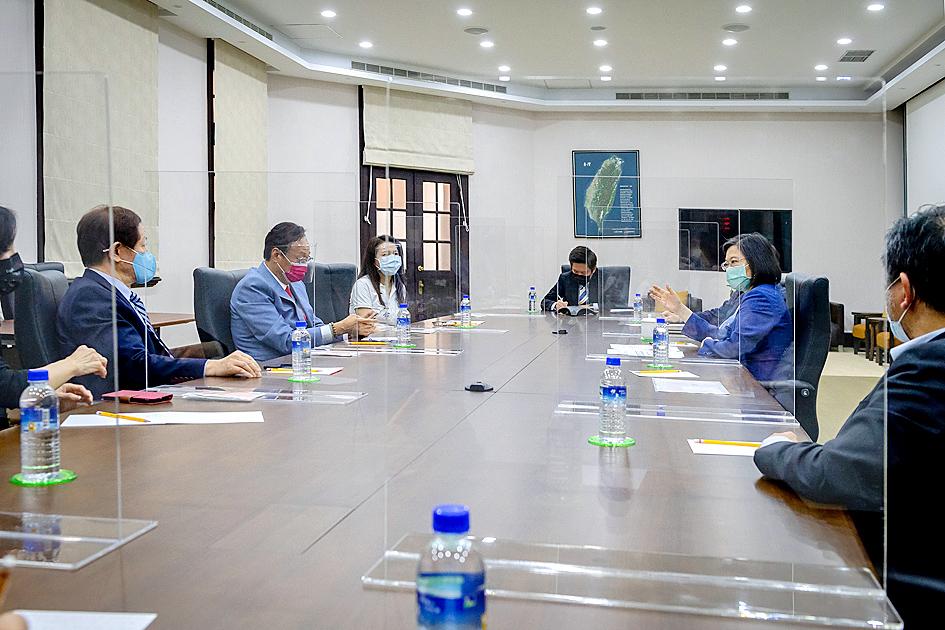The government is planning to authorize two of Taiwan’s top technology firms to represent it in negotiations to purchase up to 10 million doses of the Pfizer-BioNTech COVID-19 vaccine.
Taiwan Semiconductor Manufacturing Co (台積電, TSMC) and the Hon Hai Precision Industry Co (鴻海精密)-affiliated YongLin Foundation would be allowed to negotiate the purchase of up to 5 million doses each, with the condition that the vaccines must be procured from the German company and government agencies would be tasked with distributing the doses, Executive Yuan spokesman Lo Ping-cheng (羅秉成) said yesterday.
Lo gave little indication as to how likely the efforts were to succeed, but he described how the process would work should a deal be finalized.

Photo courtesy of the Presidential Office
Delivery dates for the vaccines would be based on “the status of the nation’s vaccine procurement efforts and the capacity of the manufacturer,” Lo said.
The process would follow the precedent set by Japan’s donation of 1.24 million doses of the AstraZeneca COVID-19 vaccine earlier this month, Lo said.
Following international standard practice, the government would provide a liability disclaimer to the manufacturer and assume full responsibility for the distribution of the doses, he said.
Meanwhile, with the assistance of the German government, Taiwan would continue its own negotiations with BioNTech to meet domestic vaccine demand, Lo said.
Yesterday’s announcement came amid ongoing efforts by Hon Hai founder Terry Gou (郭台銘) to privately procure 5 million vaccine doses through the foundation — an initiative the government initially treated with skepticism.
However, due to an ongoing shortage of vaccines, officials have changed their tune and expressed willingness to cooperate with private procurement efforts, as long as they meet regulatory standards.
Ahead of the announcement yesterday, Gou on Facebook expressed frustration over what he said was the government’s continued hedging despite public support for his efforts.
“If there are no breakthroughs on the vital issues, then we are just spinning in circles,” Gou said. “Unlike other types of donations, vaccine donations touch on a specific set of legal obligations. The government must clearly state its position so that the donor can negotiate the quantity of the order and delivery time with the manufacturer.”
Gou requested a meeting with President Tsai Ing-wen (蔡英文) on the issue, saying: “Without a clear statement from you [Tsai], the vaccine procurement process cannot truly begin.”
Later yesterday, Tsai met with Gou and TSMC chairman Mark Liu (劉德音).
The Presidential Office said in a statement released after the meeting that Tsai expressed gratitude to Gou and Liu, and that she has instructed the Executive Yuan to provide full support to their efforts, helping them complete the authorization process as quickly as possible.
The three agreed that the doses must be “manufactured and packaged by the original manufacturer, and delivered straight to Taiwan,” the office said.

The Ministry of the Interior (MOI) is to tighten rules for candidates running for public office, requiring them to declare that they do not hold a Chinese household registration or passport, and that they possess no other foreign citizenship. The requirement was set out in a draft amendment to the Enforcement Rules of the Public Officials Election and Recall Act (公職人員選舉罷免法 ) released by the ministry on Thursday. Under the proposal, candidates would need to make the declaration when submitting their registration forms, which would be published in the official election bulletin. The move follows the removal of several elected officials who were

The Republic of China (ROC) is celebrating its 114th Double Ten National Day today, featuring military parades and a variety of performances and speeches in front of the Presidential Office in Taipei. The Taiwan Taiko Association opened the celebrations with a 100-drummer performance, including young percussionists. As per tradition, an air force Mirage 2000 fighter jet flew over the Presidential Office as a part of the performance. The Honor Guards of the ROC and its marching band also heralded in a military parade. Students from Taichung's Shin Min High School then followed with a colorful performance using floral imagery to represent Taiwan's alternate name

FOUR DESIGNATED AREAS: Notices were issued for live-fire exercises in waters south and northwest of Penghu, northeast of Keelung and west of Kaohsiung, they said The military is planning three major annual exercises across the army, navy and air force this month, with the navy’s “Hai Chiang” (海強, “Sea Strong”) drills running from today through Thursday, the Ministry of National Defense said yesterday. The Hai Chiang exercise, which is to take place in waters surrounding Taiwan, would feature P-3C Orion maritime patrol aircraft and S-70C anti-submarine helicopters, the ministry said, adding that the drills aim to bolster the nation’s offshore defensive capabilities. China has intensified military and psychological pressure against Taiwan, repeatedly sending warplanes and vessels into areas near the nation’s air defense identification zone and across

A Chinese takeover of Taiwan would severely threaten the national security of the US, Japan, the Philippines and other nations, while global economic losses could reach US$10 trillion, National Security Council Deputy Secretary-General Lin Fei-fan (林飛帆) wrote in an article published yesterday in Foreign Affairs. “The future of Taiwan is not merely a regional concern; it is a test of whether the international order can withstand the pressure of authoritarian expansionism,” Lin wrote in the article titled “Taiwan’s Plan for Peace Through Strength — How Investments in Resilience Can Deter Beijing.” Chinese President Xi Jinping’s (習近平) intent to take Taiwan by force